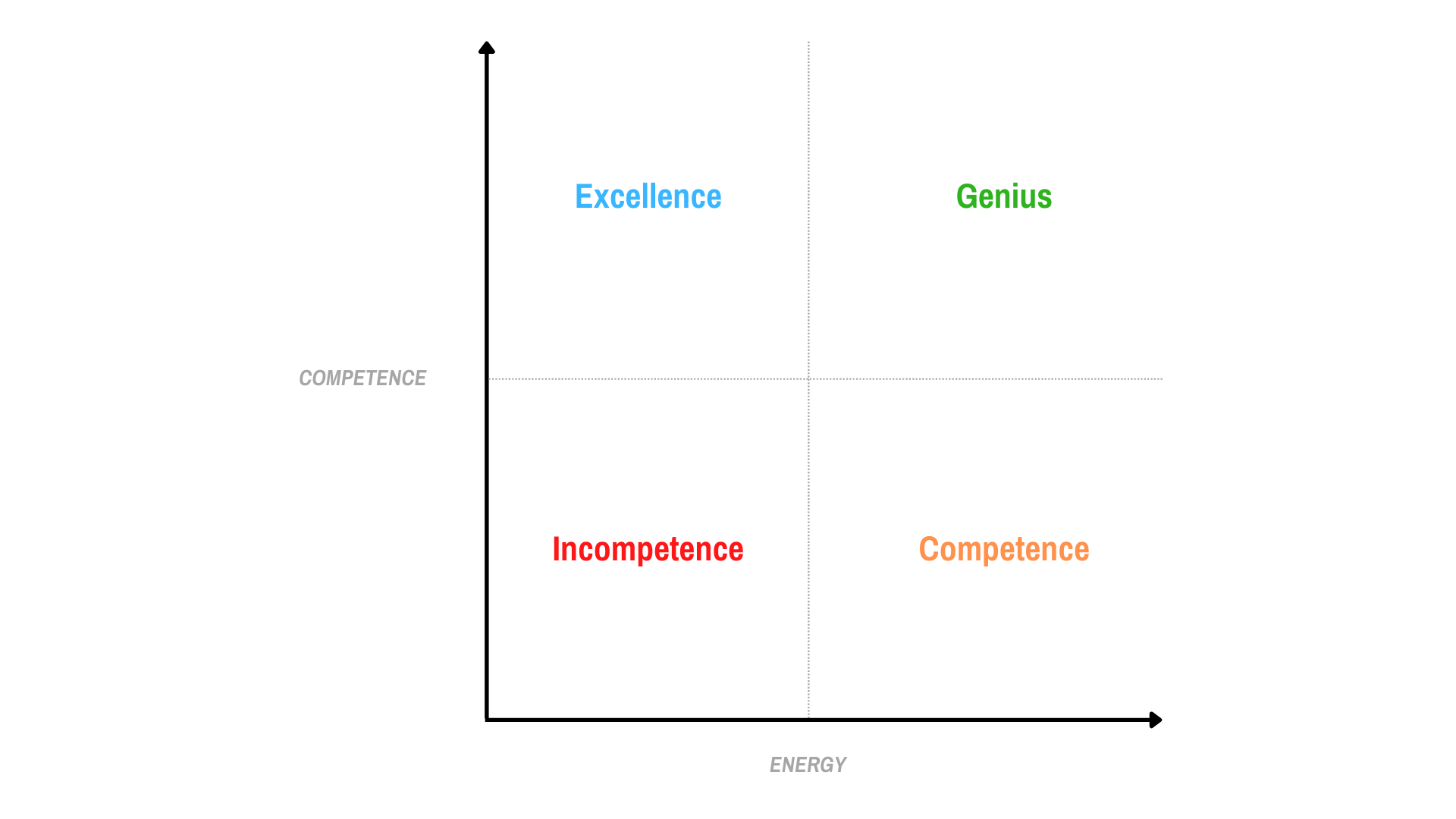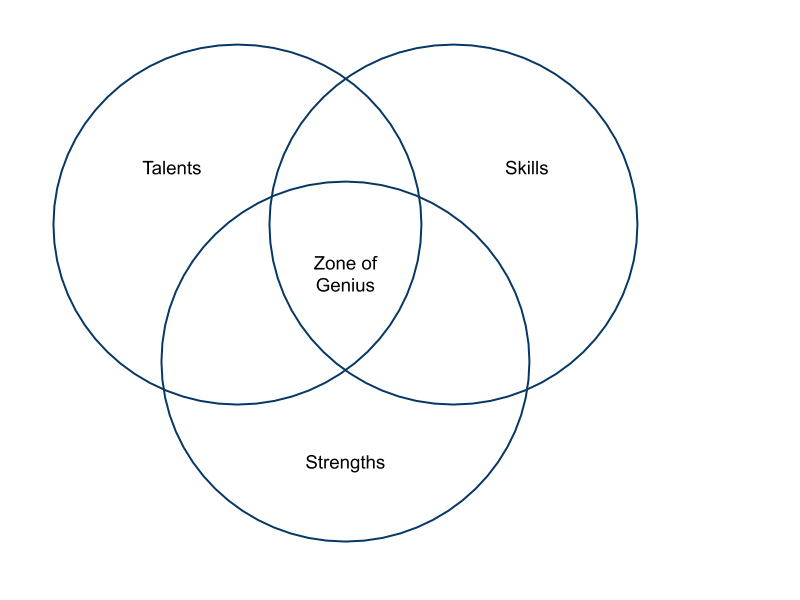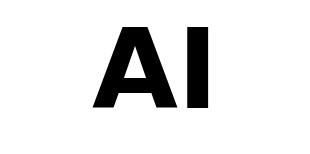Zone of Genius
First I'll frame up where this topic sits from my perspective so let's start with Andy Grove's framework from High Output Management...
MO = F [ Output of their team, Output of teams they influence]
The formula focuses on output rather than inputs. Elite organizations, teams and managers think about this in terms of productivity. From an economics standpoint, productivity is defined as:
A measure of economic performance that compares the amounts of goods and services produced (output) with the amount of inputs used to produces those goods and services.
Now we're moving closer to the concept of effectiveness vs efficiency which Peter Drucker breaks down well in The Effective Executive.
Efficiency is doing things right; effectiveness is doing the right things.
Drucker describes being truly effective as doing the right things the right way. So the best managers define the right goals (what to work on), get them done (being effective) and, ideally, in the right way (efficiency).
Zone of Genius is outlined in The Big Leap by Gay Hendricks and helps leaders manage people and find harmony between the organization's needs (goals, projects, tasks, etc.); competency levels across people; and career development - pointing people toward what they enjoy/want. If management does this well across levels it can have a significant boost in overall results & productivity.
My Experience with Zone of Genius
I first heard of Zone of Genius at HVMN. Up until that point in consulting & startups it seemed idealistic – you had a team, usually 3-8 people, and you just got shit done that mapped toward goals.
The idea that you only work on things you like and are good at seemed off. Would someone else want to do those things? Would they be good at it? It wasn't until I started managing larger teams and needed to focus on higher leverage activities (strategy, goal setting, etc.) that I realized the importance of this concept.
Short term there will be pain and upfront costs to delegate, train and give feedback to unload the things that don't make sense for you to work on. But long-run, championship teaming is about putting the right folks in the right positions to have the most impact.
The Zones

Incompetence aka "Zone of Irresponsibility"
When someone is working on an area of responsibility (aor) they're both incompetent in and have low energy/do not enjoy. If this is you, flag it to your manager; if you're a manager you must recognize this and either:
- Proactively & quickly train your direct report.
- Redistribute your direct report to another AOR & backfill.
- Transition your direct report out of your org, or the company.
I call this the Zone of Irresponsibility to highlight something. If you're in this zone with one of your AORs it's up to you to flag it and it's up to your manager to flag it as well, and ideally, avoid the situation. If a situation like this goes without correction then it is irresponsibility.
Competence aka the "Zone of Mediocrity"
Someone is clearly not the best in terms of competence (Strength, Skill, Talent) but likely ok with it because it may give them energy. Managers can't be ok with this and should actively pursue better resource allocation.
Excellence aka the "Zone of Temporary High Performance"
Someone talented and competent is doing something which doesn't create energy for them. Over time it can lead to burn out of top performers so managers must correct it for long-run productivity.
Zone of Genius
Someone is highly competent at the work and highly energized by it. There is true harmony between strengths, skills, talents and energy production.
Will we always be in our Zone of Genius? No. But as leaders, managers and individual contributors we need to be aware of this framework and operating as close to our Zone of Genius as possible to create the most value for our team, company, customers, etc.
Finding Zone of Genius
Some people worry that if each of us operates solely in our Zone of Genius, no one will be available to do the un-fun stuff. This is a false fear. There are many personality types. For every activity that feels un-fun to you, there is someone out there who not only excels at it, but loves it. The key in any organization is for people to be transparent about what their Zone of Genius is, and then map all activities to the right people through Areas of Responsibility (AORs).
– Matt Mochary, The Great CEO Within
I'm going to share a few ideas that might help you find your Zone of Genius.
A big part of why I thought Zone of Genius was idealistic is because I worked in consulting where, in my experience, management isn't a real thing. It's politics and, if you're lucky, mentorship.
You're often supporting a large project or engagement, and so, what specific goals, objectives and outcomes do you own? Now, I recognize this changes slightly at the manager level.
So I'm still a bit skeptical of Zone of Genius early on in your career. I think a lot of things have to happen right for you to find it, and I don't think it's common, because there aren't a lot of great companies out there, sadly.
Now, much of this is in the context of my experience in startups, but hear me out on what needs to happen for you to find it early.
- World Class Team – before you even join, there has to be a killer team of drivers who have a Zone of Genius, or a few of them, that are super valuable to the company and matches at least one Job Description or Focus Area.
- Recruiting – in order for the above to have happened, and for you to be the right fit for the role, the company needs to have a clear sense of (a) what you'll do right away and (b) a vision for your growth.
- Management – last but not least, you have to have really good managers that make it easy for you to be proactive, for conversations about your Zone of Genius to start early, and who cultivate your strengths, talents, etc.
Now let's talk about your first few years...
Let's face it – you don't know shit. You probably won't be truly competent for 1-3 years depending on role, support, etc. My advice is to focus on learning and covering a lot of ground early on.
Why? Figuring out what you're (a) good at and (b) get energy from requires experience. Even doing things you don't enjoy as much, will grant you exposure that makes you a better leader down the road.
Example: I don't love Sales, I'm more operations oriented, but I've done a fair amount of it. My experience leading GTM efforts and as an Account Executive have made me a more effective leader and able to think about how to set up the operations & process (Sales Ops) to empower the people who are excellent at Sales (Competence + Energy) to focus on revenue generation, not ops.
So we've established it takes time to uncover competence (strengths, talents, skills) and areas that create energy. Zone of Genius is something you should revisit consistently and as part of career dev convos with your managers. You'll start to develop and stack skills then take on new responsibilities, e.g. management or partnerships, that may fall within your Zone of Genius.
This is true whether you're a few years in or a seasoned executive. Especially at startups the organization pivots around new goals, markets and overall strategic direction. You may be tasked with a new set of responsibilities, targets and resources to achieve them. You'll have to consider your Zone of Genius and that of your team to be most effective.
The Manager's Handbook is a podcast and online resource I came across a few months ago. I like how they break down someone's performance and Zone of Genius into a Venn Diagram based on 3 elements.
- Strength - something that gives you energy.
- Talent - an innate ability that can't be taught (e.g. math wizard).
- Skill - a competency that can be taught (e.g. Excel).

At the top I framed up how Zone of Genius fits into output, productivity and efficiency. Another quote to tee up how it plugs into time management.
You can't manage what you don't measure
– Peter Drucker
Petey D believed all knowledge workers had a duty to manage themselves as execs. His surveys highlighted even experienced knowledge workers would set clear priorities, A/B/C, but an audit of their calendar would highlight most time being spent on X/Y/Z, things other than their top goals.
A great way to review both time & energy is with an audit. I will link a template below so you can do this. The audit helps with two things:
- Confirms what you're actually spending time on. From there you can delegate, reorient your calendar, hire new people, etc.
- Forces an honest assessment of how the way you're spending your time impacts your energy – is it draining you or charing your batteries?
